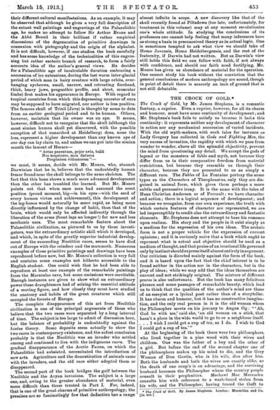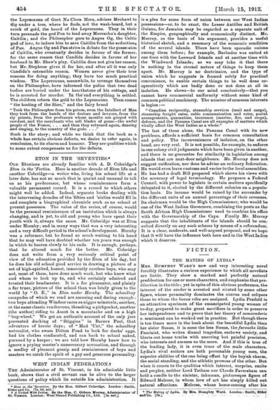THE CROCK OF GOLD.•
The Crock of Gold, by Mr. James Stephens, is a romantic fantasy, a caprice. Even a caprice, however, for all its charm and humour, must have some continuity of development ; and Mr. Stephens's book fails to satisfy us because it lacks this continuity : it represents neither any development of character in action nor any mechanical succession of varied incidents. With the old myth-makers, with such tales for instance as Lady Gregory has collected in Gods and Fighting Men, the very excess of invention, the rapidity with which we pass from wonder to wonder, above all the splendid objectivity, prevent the mind from questioning any detail. We accept the gods of legend or the monsters of fable and myth, not because they differ from us in their comparative freedom from material restrictions, but because they resemble us through their character, because they are presented to us as simply a different race. The Fables of La Fontaine portray the same types as the Characters of Theophrastus, only they are dis- guised in animal form, which gives them perhaps a more subtle and persuasive irony. It is the same with the tales of Hans Christian Andersen or of Perrault ; we have character and action ; there is a logical sequence of development ; and because we recognize, from our own experience, the truth with which certain features of character are represented, we are led imperceptibly to credit also the extraordinary and fantastic elements. Mr. Stephens does not attempt to base his romance upon realism. His story and the people in it exist simply as a medium for the expression of his own ideas. The archaic form is not a proper vehicle for the expression of current opinions ; and it is curiously naive that a book which ought to represent what is actual and objective should be used as a medium of thought, and that praise of an irrational life governed only by instinct should express itself almost entirely in argument. Our criticism is directed mainly against the form of the book, and it is based upon the fact that the chief interest is to be found neither in the action nor in the characters, but in the play of ideas; while we may add that the ideas themselves are current and not strikingly original. The mixture of different genres is also unfortunate. But the book has many felicitous phrases and some passages of remarkable beauty, which lead us to think that the qualities of the author's mind are those of an essayist or a lyrical poet rather than of a storyteller. It has charm and humour, but it has no constructive imagina- tion, and the only real person in it is the old woman whom the Philosopher meets on his journey to Angus Og : " Ah, God be with me,' said she, an old woman on a stick, that hasn't a place in the wide world to go to or a neighbour itself. . . . I wish I could get a cup of tea, so I do. I wish to God I could get a cup of tea.' " At the beginning of the book there were two philosophers, who lived together in a pine wood with their wives and children. One was the father of a boy and the other of a girl. But before the end of the second chapter one of the philosophers makes up his mind to die, and the Grey Woman of Dun Gortin, who is his wife, dies after him. Both the husbands and both the wives are exactly alike, so the death of one coupe is an advantage, and the surviving
husband becomes the Philosopher whom the country people consult in their perplexities. Mechawl Mac Murrachn consults him with reference to a wash-board stolen from his wife, and the Philosopher, having traced the theft to
• The Crock of Gold. By James Stephens. London: Macmillan and Co. [5s. net.1
the Leprecauns of Gort Na Cloca Mora, advises Mechawl to tlig under a tree, where he finds, not the wash-board, but a crock of gold, the hoard of the Leprecanns. They in their turn persuade the god Pan to lead away Murrachu's daughter,
Caitilin ; and the Philosopher goes to Angus Og, the Celtic god of love, to induce him to save Caitilin from the seductions
Of Pan. Angus Og and-Pan strive in debate for the possession of Caitilin, who eventually decides in favour of the former,
for the same reason that Candida decides in favour of her husband in Mr. Shaw's play. Caitilin does not give her reason, but Mr. Stephens gives it for her, and after all it was only Candida's ostensible reason. Women never give their true reasons for doing anything; they have too much practical wisdom. The Leprecauns, meanwhile, to revenge themselves on the Philosopher, have informed -the police that two dead bodies are buried under the hearthstone of his cottage, and he is arrested for murder." In the end- everything is settled. The children return the gold to the Leprecauns. Then comes " the hosting of the Shee," and the fairy brood " Took the Philosopher from his prison, even the Intellect of Man they took from the hands of the doctors and lawyers, from the sly priests, from the professors whose mouths are gorged with sawdust, and the merchants who sell blades of grass—the awful people of the Fomor, . . . and then they returned again, dancing and singing, to the country of the gods. . . ."
'Such is the story ; and while we think that the book as a whole has certain obvious defects, we desire to refer again, in conclusion, to its charm and humour. They are qualities which to Some extent compensate us for the defects. -















































 Previous page
Previous page